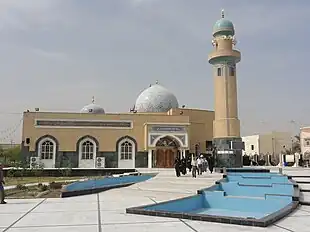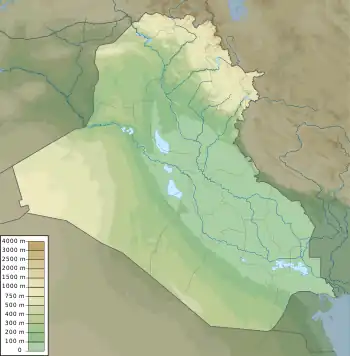Al-Hannanah Mosque
The Al-Hannanah Mosque (Arabic: مَسْجِد ٱلْحَنَّانَة, romanized: Masjid al-Ḥannānah) is a Shi'ite mosque in Najaf, Iraq. This mosque is also called Masjid ar-Raʾs (Arabic: مَسْجِد ٱلرَّأْس), meaning "Mosque of the Head" (of Husayn ibn Ali), because Husain's head was kept in its middle, when being brought to his opponent Ubayd Allah ibn Ziyad, according to a hadith (narration) attributed to his descendant, Ja'far al-Sadiq.[1][2]
| Al-Hannanah Mosque Mosque of the Head | |
|---|---|
Masjid Al-Ḥannānah (مَسْجِد ٱلْحَنَّانَة) Masjid Ar-Raʾs (مَسْجِد ٱلرَّأْس) | |
 The mosque, pictured in 2013 | |
| Religion | |
| Affiliation | Islam |
| Rite | Shi'ite |
| Ecclesiastical or organisational status | Mosque and shrine |
| Status | Active |
| Location | |
| Location | Kufa-Najaf Metropolis, Iraq |
 Location in Iraq  Al-Hannanah Mosque (Middle East)  Al-Hannanah Mosque (West and Central Asia) | |
| Geographic coordinates | 32°00′18″N 44°20′04″E |
| Architecture | |
| Type | Islamic architecture |
| Founder | Abbas I of Persia |
| Specifications | |
| Dome(s) | 1 |
| Site area | 7,400 square metres (80,000 sq ft) |
Specifications
Al-Hannanah Mosque is located in the metropolis of Najaf and Kufah, near the grave of Kumayl ibn Ziyad. It has area of 7,400 square metres (80,000 sq ft).[3][4] According to Shaykh Al-Mufid, Sayyed Ibn Tawus and Shahid Awwal, when people arrived at Al-Hannanah Mosque, they should recite two unit prayers.
History
Jaafar Mahbouba believes that this mosque was built along with Imam Ali Shrine. Al-Buraqi believed that this mosque was built by order of Abbas I of Persia, and that because of this, he was known amongst the people of Najaf. According to Mohammad Hirz Eddin and Mirza Hadi el-Khurasani, Ghazan ibn Hulagu Khan ordered its construction.[2]
According to a narration of Ja'far al-Sadiq, after Ali ibn Abi Talib died, his sons Hasan and Husayn, carried his body from Kufa to Najaf. As they were passing, the pillars of the mosque inclined towards the body.[3][5] The name Al-Hannanah means "to cry twice." This refers to two events. First, when Ali's burial shroud was brought to the Mosque, and then when the head of his son Husayn was brought through the Mosque.
See also
References
- Qumi, Abbas (2014). Nafasul Mahmoom. CreateSpace Independent Publishing Platform. ISBN 978-1502504067.
- Staff writer. "The Mosque of the Rass". imamali. Archived from the original on 2016-04-07. Retrieved 2018-01-04.
- Staff writer. "Iraq". Al-Islam.
- Hann, Geoff; Dabrowska, Karen; Townsend-Greaves, Tina (2015). Iraq: The ancient sites & Iraqi Kurdistan. Bradt Travel Guides. ISBN 978-1841624884.
- Majlisi Muhammad Baqir. Bihar al-Anwar. Vol. 97. p. 455.
.png.webp)


